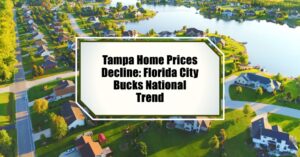If you're considering buying or selling property in Florida, you need to understand the current state of the Florida Housing Market. Good news is on the horizon for potential homebuyers. After a period of intense competition and soaring prices, the Florida Housing Market is showing signs of normalizing in 2025, with increased inventory and a slight easing of median prices creating more opportunities.
For years, it felt like finding an affordable home in Florida was like searching for a seashell on an endless beach – possible, but increasingly challenging. We saw historically low inventory, leading to bidding wars and prices that seemed to climb endlessly.
However, the latest data from Florida Realtors® for March and the first quarter of 2025 indicates a shift. We're seeing more new listings hitting the market, giving buyers more options to choose from. This increase in for-sale inventory, coupled with a slight dip in median prices compared to last year, suggests a welcome change for those looking to make Florida their home.
Key Trends Shaping the Florida Housing Market in 2025
Let's dive deeper into some of the crucial factors influencing the Florida Housing Market right now:
- Increased New Listings: In March 2025, new listings for existing single-family homes saw a significant jump of 10.8% compared to March 2024. This trend continued into the first quarter, with a 9.6% increase year-over-year. The condo-townhouse sector also saw growth in new listings, with a 5.8% increase in March and a 4.1% rise in the first quarter. This influx of new properties provides buyers with more choices and can ease some of the competitive pressure.
- Rising Inventory: The number of active listings, or for-sale inventory, has also increased for both single-family homes and condo-townhouses in March and the first quarter of 2025. This is a significant development, as higher inventory levels typically give buyers more negotiating power and can contribute to a more balanced market.
- For single-family homes, the supply reached 5.5 months in both March and the first quarter of 2025.
- The condo-townhouse market saw a more substantial increase in supply, reaching 10.1 months for both periods. This suggests that buyers may have even more leverage in the condo and townhouse segment.
- Easing Median Prices: After years of consistent price increases, we're finally seeing some downward pressure on median sales prices.
- The statewide median sales price for existing single-family homes in March 2025 was $412,500, a 1.9% decrease compared to the previous year. For the first quarter, the median price was $414,555, a slight decrease of 0.1% year-over-year.
- The condo-townhouse market experienced a more significant price easing, with a median sales price of $315,000 in March, down 4.5% from the year before. The first quarter also saw a 3.2% decrease in the median price, remaining at $315,000.
- Slight Dip in Closed Sales: While the market is normalizing, closed sales have seen a slight decline.
- In March 2025, closed sales of existing single-family homes were down 1.3% year-over-year, and first-quarter sales were down 1.9%.
- The condo-townhouse sector experienced a more significant drop, with March sales down 9.8% and first-quarter sales down 9.2% compared to the previous year.
However, it's important to note, as Florida Realtors Chief Economist Dr. Brad O'Connor pointed out, that the number of single-family homes going under contract in March actually increased by over half a percent year-over-year. This suggests that we might see an uptick in closed sales in the near future.
The Role of Mortgage Rates
Interest rates play a huge role in the housing market, and Florida is no exception. Dr. O'Connor highlighted the impact of fluctuating mortgage rates. The fact that the average 30-year fixed mortgage rate hovered around 6.75% for most of March 2025, compared to the higher rates in January and February (above 7%), likely contributed to the increased number of pending sales in March. However, with rates climbing back up, this positive momentum might be temporary. Keep a close eye on mortgage rate trends if you're planning to buy.
Why This Normalization is Good News
For prospective homebuyers who've felt priced out or discouraged by the intense competition, this shift in the Florida Housing Market offers a glimmer of hope. More inventory means more options, less frantic bidding wars, and potentially more room for negotiation. The easing of median prices can also make homeownership more attainable for a wider range of buyers.
Navigating the Market: The Importance of Expert Guidance
Even with these positive changes, buying or selling a home is a significant financial decision. As 2025 Florida Realtors President Tim Weisheyer wisely stated, it “requires expert guidance to navigate the process and understand the nuances of local market dynamics.” This is where a knowledgeable and experienced Realtor® becomes your invaluable partner. They possess in-depth knowledge of local market conditions, can help you identify the best opportunities, and guide you through every step of the transaction. Their expertise can be the key to achieving your real estate goals, whether it's finding your dream home or securing the best possible price for your property.
My Perspective as an Observer of the Florida Housing Scene
Having followed the ups and downs of the Florida Housing Market for some time now, the current normalization feels like a breath of fresh air. While the rapid price appreciation of the past few years was beneficial for sellers, it created significant challenges for those trying to enter the market. A more balanced market, with a healthy supply of homes and more stable prices, is ultimately more sustainable in the long run. It allows more people to achieve the dream of homeownership in this desirable state.
However, it's crucial to remember that real estate is inherently local. What's happening in Miami might be different from what's occurring in Jacksonville or the Panhandle. Therefore, relying on broad statewide trends alone isn't enough. Working with a local real estate professional who understands the specific dynamics of your target area is more important than ever.
Looking Ahead
While the data suggests a cooling trend, the fundamental appeal of Florida remains strong. Its favorable climate, diverse economy, and attractive lifestyle continue to draw people from all over the country. This sustained demand will likely prevent a drastic downturn in prices. Instead, we might be entering a period of more moderate price growth or even price stability in some areas.
For sellers, this means it's crucial to be realistic about pricing and to work with your agent to develop a strategic marketing plan to attract qualified buyers. For buyers, it's an opportunity to take a more measured approach, explore different neighborhoods, and potentially find a home that fits both their needs and their budget.
In Conclusion
The Florida Housing Market in 2025 is showing clear signs of normalization. Increased new listings, rising inventory, and an easing of median prices offer a more favorable environment for homebuyers. While closed sales have seen a slight dip, the increase in pending sales suggests potential positive momentum ahead. Navigating this evolving market requires a keen understanding of local dynamics and the expert guidance of a qualified Realtor®. Whether you're looking to buy or sell, staying informed and working with a professional will be key to success in the Sunshine State's real estate landscape.
Work with Norada, Your Trusted Source for
Real Estate Investment in “Top Florida Markets”
Discover high-quality, ready-to-rent properties designed to deliver consistent returns.
Contact us today to expand your real estate portfolio with confidence.
Contact our investment counselors (No Obligation):
(800) 611-3060
Read More:
- This Florida Housing Market Bucks National Trend With Declining Prices
- Florida Housing Market Crash 2.0? Analyst Warns of 2008 Echoes
- Tax Relief Proposed as Florida Housing Market Faces Deepening Crisis
- Is the Florida Housing Market on the Verge of Collapse or a Crash?
- 3 Florida Cities at High Risk of a Housing Market Crash or Decline
- Florida Housing Market: Record Supply Expected to Favor Buyers in 2025
- Florida Housing Market Forecast for Next 2 Years: 2025-2026
- Florida Housing Market: Predictions for Next 5 Years (2025-2030)
- Hottest Florida Housing Markets in 2025: Miami and Orlando
- Florida Real Estate: 9 Housing Markets Predicted to Rise in 2025
- 3 Florida Housing Markets Are Again on the Brink of a Crash
- Florida Housing Market Predictions 2025: Insights Across All Cities
- When Will the Housing Market Crash in Florida?
- South Florida Housing Market: Will it Crash?



